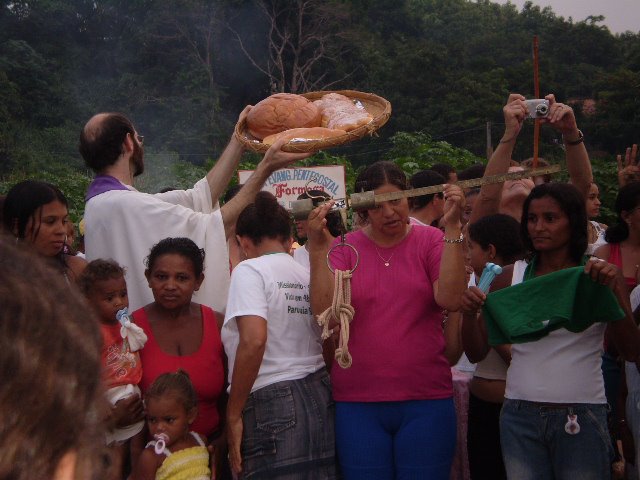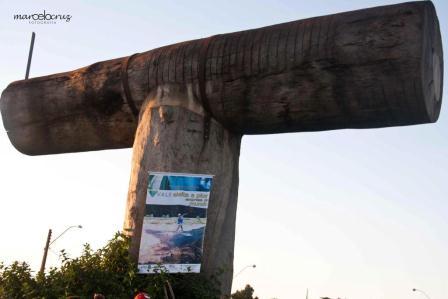Daniel Comboni
Comboni Missionaries
Institutional area
Other links
Newsletter
Rome, Saturday, August 18, 2012
Dario Bossi, 40 years old, a Comboni Missionary from Samarate (Varese-Italy) arrived in Açailândia, Brazil, 5 years ago after 6 years spent in Padua and other 4 in São Paulo where he helped troubled youth. Together with the inhabitants of 27 municipalities, for a total of 100 communities that live next to the railway, Fr. Bossi waged a war against the project, a high environmental danger, of the mining company Vale that intended to double the railway that crosses the Amazons state of Parà. The news comes from the daily “Corriere della Sera”.
The parallelism with the biblical episode is a natural and Fr. Dario has heard it quoted many times over recently: “Forgive me, Father, but don’t you feel a little like David after his encounter with Goliath?” He reflects on it, weighing his words, then with great humility, but also with satisfaction he says: “Yes, but I was not alone in this battle. We were many in throwing the stone.” And Goliath fell. The giant conquered by the little Comboni missionary who reach Brazil from Varese, is the mining colossus Vale to which a judge, Ricardo Macieira, has ordered to suspend the work of enlarging the rail line of Caraiás: 900 km of railway, from the iron mines of the company all the way to the port of São Luis through the state of Pará. “It was a project worth 28 billion dollars which – Fr. Dario explains on the phone – with the opening of new large mines and the enlarging of the harbor, had been presented as a minor improvement thus avoiding the evaluation of the environmental factor and the consent of the population...” To give an idea of how ‘small’ the project was the missionary adds: “Today on this line there are daily 24 trains with 330 cars; doubling the project, they would have a train every 25 minutes, 58 each day. And since each train with its load of iron, pollution and noise is 4 km long and it takes 5 minutes to rumble by, this means taking away each day one fifth of the life of the people who live along its tracks. “People like the 104 thousand inhabitants of Acailandia, in Maranhão, where Fr. Bossi has his mission. “In particular the 380 families of the barrio Piquia de Baixo – he says – threatened by the foundries without filter where they work the pig iron, so called for its pollution.” He arrived here, “A land of conflicts generated by ravaging that erases the future”, five years ago after 6 years spent doing youth work in Padua and other four in São Paulo with youth in trouble with the law.
He is 40 years old and left Samarate, a town of 16 thousands near Varese, when he was very young following the example of a local little friar who in Brazil is considered almost a saint. “Fr. Daniele, who died among the lepers in 1917. It was destined that I should reach this place.” And here he found the battle of the 27 municipalities, 100 communities total that live connected to the railway. “First of all the place of the Quilombolas, the descendants of African salves, who more than anybody else suffer under the impact of this neocolonialism that takes without giving.” In his blog Fr. Dario has written: “The river Pindaré runs slow and wide in winter along villages in the deep interior of our Maranhão. Groups of families have settled on the land along the river: a small agrarian reform that breaks up like the spots of a leopard the land of the fazendeiros. Near the shore there is another parallel flow, the railway of Vale that transports 300 thousand tons of mineral iron a day, all for export. This train of profit doesn’t stop, does not have obstacles. It runs over, it kills, it keeps people awake with its noise and cracks the mud walls of the houses nearby.” So when the work to double the railway began he presented the case to the court together with the missionary indigenous council, the society of human rights of Maranhão and the Center of Afro culture, with the blessing of the “Rede Justica nos Trilhos” (Justice on the Rails). The judge decided that the work had to be suspended immediately because the license given to Vale by the Environment Institute was irregular. And everything stopped. Now they are waiting for the appeal. And Davide, the missionary arrived in Brazil from Varese, already has in his pocket four more stones picked from the river to be ready for new battles with the iron giant.
Mangiarotti Alessandra





